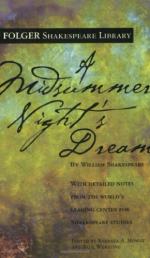|
This section contains 10,209 words (approx. 35 pages at 300 words per page) |

|
SOURCE: "Bottom's Dream," in Something of Great Constancy: The Art of "A Midsummer Night's Dream," Yale University Press, 1966, pp. 111-66.
In the following excerpt, Young argues that Shakespeare uses the dream motif and fairy magic in A Midsummer Night's Dream to explore philosophical and psychological ideas, focusing in particular on the relationship between nature and art.
"Man is but an ass," says Bottom, "if he go about to expound this dream." That might serve as a warning to commentators. Serious discussions of comedy always take place near the precipice of academic fatuity. Nonetheless, it is possible to be too cautious; studies of Shakespeare's philosophical and psychological preoccupations have in the past dealt almost exclusively with the tragedies and histories. Such exclusion inevitably leaves the impression that the comedies are somehow thoughtless. More recently, plays like Troilus and Cressida have been shown to have serious content, but such content...
|
This section contains 10,209 words (approx. 35 pages at 300 words per page) |

|


